- Home
- Mario Puzo
The Sicilian Page 18
The Sicilian Read online
Page 18
And Guiliano did think all that night. The idea pleased him that he would someday be one of the ghosts of history. If he were killed he hoped it would be in the mountains; he had the fantasy that, wounded, he would crawl into one of the thousands of caves and never be found until some accident discovered him, as had happened with Hannibal’s elephant.
They changed encampments many times during the winter. And for weeks at a time the band dispersed altogether and slept in the houses of relatives, friendly shepherds, or the great empty granaries that belonged to the nobility. Guiliano spent most of the winter studying his books and making his plans. He had long talks with Hector Adonis.
In early spring he went with Pisciotta down the road that led to Trapani. On that road they saw a cart with new painted legends on its sides. For the first time they saw a panel showing the legend of Guiliano. It was a scene painted in gaudy reds, Guiliano taking the emerald ring from the finger of the Duchess as he bowed before her. In the background was Pisciotta holding a machine gun and threatening a group of cowering armed men.
It was on that day, too, that they first wore the belt buckles with an eagle and a lion rampant etched on a rectangular block of gold. The buckles had been made by Silvestro, who now served as their armorer. He had given them to Guiliano and Pisciotta. It became an emblem of their leadership of the band. Guiliano always wore it; Pisciotta only when he was with Guiliano. For Pisciotta often went into the towns and villages disguised, even into the city of Palermo.
At night in the mountains Guiliano, when he took off the belt, studied the rectangular buckle of gold. On the left side, there was an eagle that looked like a man in feathers. On the right side was a lion rampant, its paws—like the eagle’s winged arms—supporting a filigree circle between them. It looked as if together they were spinning a wheel of the world. The lion especially fascinated him with its human body below the leonine head. The king of the air, the king of the ground, etched into soft yellow gold. Guiliano thought of himself as the eagle, Pisciotta the lion, and that circle, Sicily.
For centuries, kidnapping of the rich had been one of the cottage industries of Sicily. Usually the kidnappers were the most fearsome of the Mafiosi, who had merely to send a letter before the kidnapping. This would be in the polite form, to the effect that to avoid troublesome details the ransom be paid in advance. Like a wholesaler’s discount for immediate cash payment, the ransom would be considerably less because all the irritating details, such as the actual kidnapping, did not have to be performed. For in all truth, such a thing as kidnapping a famous personage was not as easy as people thought it was. It was not a business for greedy amateurs or scatterbrained lazy good-for-nothings who refused to work for a living. Nor was it ever the harebrained, suicidal event that it was in America, where its practitioners had given kidnapping a bad name. Even the word “kidnapping” was not used in Sicily, since children were not held for ransom unless they were accompanied by an adult. For say what you would of a Sicilian: that they were born criminals, that they murdered as easily as a woman picks flowers, that they were as cunningly treacherous as Turks, that they were socially three hundred years behind the times; yet no one could dispute that Sicilians loved, no, they idolized children. So there was no such thing called kidnapping in Sicily. They would “invite” a rich person to be their guest, and he could not be released until he had paid room and board, as in a fine hotel.
This cottage industry had developed certain rules over hundreds of years. The price was always negotiable through intermediaries such as the Mafia. There was never any violence offered to the “guest,” if he cooperated. The “guest” was treated with the utmost respect, always addressed by his rank, such as Prince or Duke or Don or even Archbishop, if some bandit chose to endanger his soul by seizing a member of the cloth. Even a Member of Parliament was called Honorable to his face though everyone knew these rascals were greater thieves than anyone.
This was done out of prudence. History showed it was a policy that paid off. Once the prisoner was released he did not show any desire for vengeance as long as his dignity had been preserved. There was the classic case of a great Duke, who, after being released, and then leading the carabinieri to where he knew the bandits were hiding, had then paid for their defense lawyers. When despite this they were convicted, the Duke interceded to cut their long prison term in half. This was because they had treated him with such exquisite tact and politeness that the Duke declared he had never encountered such fine manners even in the highest society of Palermo.
Conversely a prisoner who had been ill-treated would, upon his release, spend a fortune having his captors hunted down, sometimes offering a reward larger than the ransom paid.
But in the ordinary course of things, if both parties behaved in a civilized manner, the price was haggled over and the prisoner released. The rich of Sicily had come to think of this as a sort of unofficial tax for their living in the land they loved, and since they paid so little taxes to the official government, they bore this cross with Christian resignation.
Stubborn refusal or extended haggling was remedied by mild coercion. Then perhaps an ear was cut off, a finger amputated. Usually these were sufficient to bring everybody to his senses. Except for those extremely sad, rare cases when the body had to be delivered, ritually mutilated and riddled with bullets, or, in the olden days, stabbed numerous times in the pattern of the cross.
But “Inviting a Guest” was always a painstaking endeavor. The victim had to be observed for a period of time so that he could be snatched with minimum violence. Even before that, five or six hiding places had to be prepared and stocked with supplies and guards, for it was understood that the negotiations would be drawn out and the authorities would search for the victims. It was a complicated business not for amateurs.
When Guiliano decided to enter the kidnapping business, he was determined to entertain only the richest clients in Sicily. In fact his first victim was the island’s wealthiest and most powerful noble. This was Prince Ollorto, who not only had vast estates in Sicily but also a virtual empire in Brazil. He was the landlord for most of the citizens of Montelepre—their farms and their houses. Politically he was the most powerful man behind the scenes; the Minister of Justice in Rome was a close personal friend, and the former King of Italy himself had stood godfather to the Prince’s child. In Sicily the overseer for all his estates was Don Croce himself. It went without saying that the magnificent salary Don Croce was paid also included insurance payments to preserve Prince Ollorto’s person from kidnappers and murderers and his jewels and cattle and sheep from thieves.
Safe in his castle, the walls guarded by Don Croce’s retainers, the gatesmen, and his own personal guards, Prince Ollorto prepared for a peaceful and enjoyable evening of watching the stars in the heavens through the huge telescope which he loved more dearly than anything on earth. Suddenly there was the sound of heavy footsteps on the winding stairs that led to his observatory tower. The door crashed in and four roughly clad men holding guns filled the tiny room. The Prince covered his telescope protectively with his arm and turned away from the innocent stars to face them. When the Prince saw Terranova’s ferretlike face, he offered up his prayers to God.
But Terranova said to him courteously, “Your Lordship, I am ordered to bring you to the mountains for a holiday with Turi Guiliano. You will be charged room and board for your visit, that is our custom. But you will be looked after like a newborn babe.”
The Prince tried to hide his fear. He bowed and asked gravely, “May I take some medicines and a few clothes?”
Terranova said, “We will send for them. Speed now is of the essence. The carabinieri will arrive shortly and they are not invited to our little party. Now please go before me down the steps. And don’t try to make a run for it. Our men are everywhere and even a Prince can’t outrun bullets.”
At the side gate far down the wall an Alfa Romeo and a jeep were waiting. Prince Ollorto was thrust into the Alfa Romeo with Terranova, th
e others jumped into the jeep, and the two vehicles sped up the mountain road. When they were a half-hour from Palermo and a short distance from Montelepre, the cars stopped and all the men got out. There was a roadside shrine with the figure of the Madonna, and Terranova knelt briefly before it and crossed himself. The Prince, who was a religious man, suppressed the impulse to do likewise, fearing it would be taken as a sign of weakness or of supplication to these men not to harm him. The five men spread out into a wide star formation, the Prince in its center. Then they started walking down a steep slope until they came upon a narrow path that led into the vast wilderness of the Cammarata Mountains.
They walked for hours, and often the Prince had to ask for a rest, which the men accompanying him granted courteously. They sat beneath a huge granite rock and ate supper. There was bread, a coarse loaf, a huge hunk of cheese and a bottle of wine. Terranova shared this equally among the men, including the Prince, and even with an apology. “I’m sorry to offer you nothing better,” he said. “When we get to our camp Guiliano will give you a hot meal, perhaps some good rabbit stew. We have a cook who worked for restaurants in Palermo.”
The Prince thanked him courteously and ate with good appetite. Indeed with better appetite than for the grand dinners he was used to. The exercise had made him ravenous, he had not felt such hunger for many years. Taking a packet of English cigarettes from his pocket, he offered them around. Terranova and each of his men took one gratefully and smoked avidly. The Prince mentally noted the fact that they did not appropriate the packet for their own use. So he was emboldened to say, “I have to take certain medicines. I am diabetic and must have insulin every day.”
He was surprised at Terranova’s concern. “But why didn’t you say so?” he asked. “We could have waited a minute. But in any case don’t worry. Guiliano will send for it and you will have it in the morning. I give you my promise.”
“Thank you,” the Prince said. Terranova’s thin, whippetlike body seemed always to crouch with courteous and intense attention. His ferret face was always smiling and receptive. But he was like a razor: of use for service but also able to turn into something deadly. And then they resumed their march, Terranova at the point of the star formation. Often Terranova would drop back to chat with the Prince and reassure him he would come to no harm.
They had been ascending and finally they reached the flat top plain of a mountain. Three fires were going and picnic tables with bamboo chairs rested near the cliff edge. At one table Guiliano was reading a book by the light of an American Army battery lamp. There was a canvas bag filled with other books resting at his feet. The bag was covered with geckos and indeed there was a loud steady hum that filled the mountain air which the Prince recognized as the sound of millions of insects. It did not seem to bother Guiliano.
Guiliano rose from the table and greeted the Prince with courtesy. There was no air about him of captor to prisoner. But there was a curious smile on his face, for Guiliano was thinking how far he had come. Two years before he had been a poor peasant; now he held at his mercy the man with the bluest blood and richest purse in all of Sicily.
“Have you eaten?” Guiliano asked. “Is there anything you need to make your visit with us more pleasant? You will be with us for some time.”
The Prince admitted to hunger and explained his need for insulin and other medicines. Guiliano called down over the side of the cliff and soon one of his men came rushing up the path with a pot of hot stew. Guiliano had the Prince write in great detail exactly what medicines he needed. “We have a chemist friend in Monreale who will open his shop for us no matter what the hour,” Guiliano said. “You will have your medicine by noon tomorrow.”
When the Prince had finished eating, Guiliano led him down a slope and into a small cave where there was a straw bed with a mattress on it. Two of the bandits following them had blankets, and the Prince was amazed to see they even had white sheets and a huge lumpy pillow. Guiliano noticed his amazement and said, “You are an honored guest and I will do everything so that you may enjoy your little vacation. If any of my men offer you any disrespect, please inform me. They have received strict instructions to treat you with all regard for your rank, and your reputation as a patriot of Sicily. Now sleep well, you will need all your strength, for we make a long march tomorrow. A ransom note has been delivered and the carabinieri will be out in force searching so we must be a long way from here.”
The Prince thanked him for his courtesy and then asked what the ransom would be.
Guiliano laughed and the Prince was charmed by that youthful laugh, the boyish handsomeness of his face. But with Guiliano’s answer the charm vanished. “Your government has set a price of ten million lire on my head. It would be an insult to Your Lordship if the ransom were not ten times as high.”
The Prince was stunned then said ironically, “I hope my family thinks as highly of me as you do.”
“It will be open to negotiation,” Guiliano said. When he left, the two bandits prepared the bed and then sat outside the cave. Despite the absolute roar of the insects, Prince Ollorto slept better than he had in years.
Guiliano had been busy throughout the night. He had sent men to Montelepre for the medicine; he had lied to the Prince when he said Monreale. Then he had sent Terranova to the Abbot Manfredi at his monastery. He wanted the Abbot to handle the ransom negotiations, though he knew that the Abbot would have to work through Don Croce. But the Abbot would be a perfect buffer, and Don Croce would get his commission.
The negotiations would be long, and it was understood that the full sum of one hundred million lire could not be paid. Prince Ollorto was very rich, but, historically, the first demand was not the real price.
The second day of Prince Ollorto’s kidnapping was a very pleasant one for him. There was a long but not arduous march to a deserted farmhouse deep in the mountains. Guiliano was very much the lord of the comfortable manor, as if he were a wealthy countryman honored by a surprise visit from his king. With his sharp eye Guiliano saw that Prince Ollorto was distressed by the condition of his clothes. That he looked regretfully at the carefully tailored English suit he had paid so much for being frayed by wear.
Guiliano asked him without contempt but only with real curiosity, “Do you really care so much for what you wear on the outside of your skin?”
The Prince had always had a pedagogical turn of mind. And certainly in these circumstances they both had time on their hands. So he gave Guiliano a speech on how correct clothing, beautifully tailored and of the finest materials, could enrich a man such as himself. He described the tailors in London, so snobbish that they made Italian Dukes seem like Communists in comparison. He told of all the different kinds of fabrics, the great skills, the time spent in getting innumerable fittings. “My dear Guiliano,” Prince Ollorto said, “it’s not the money, though Saint Rosalie knows that what I paid for this suit would keep a Sicilian family for a year, and pay for their daughter’s dowry too. But I have to go to London. I have to spend days with tailors who push me back and forth. It is a miserable experience. So I regret that this suit is ruined. It can never be replaced.”
Guiliano was studying the Prince with sympathy and he asked, “Why is it so important to you and your class that you must dress so extravagantly, or forgive me, so correctly? Even now you still wear your tie though we are in the mountains. When we entered this house I noticed you buttoned your jacket as if some Duchess were waiting to greet you.”
Now Prince Ollorto, though he was an extreme reactionary politically, and like most of the Sicilian nobility had no sense of economic justice, had always had a sense of identity with the lower classes. He felt that they were human beings like himself and no man who worked for him and minded his manners and knew his place would be left in want. The servants in his castle adored him. He treated them like members of the family. There were always gifts for their birthdays and little treats for them on the holidays. During family meals when no outside guests were present, the serv
ants waiting on the table would join in the family discussion and give their opinions on the noble family’s problems. And this was not uncommon in Italy. The lower classes were treated cruelly only when they fought for their economic rights.
And now the Prince took the same attitude toward Guiliano. As if his captor were only his servant who wanted to share his life, the enviable life of a very rich and powerful man. The Prince was suddenly aware that he could turn his period of captivity into an advantage that might even make paying his ransom worthwhile. But he knew he had to be very careful. That he had to exert his charm to the utmost without any condescension. That he had to be frank and sincere and as truthful as he could be. And that he could not try to make too much capital of the situation. For Guiliano could spring from weakness to strength.
So now he answered Guiliano’s question seriously and with great genuineness. He said with a smile, “Why do you wear that emerald ring, that gold buckle?” He waited for an answer, but Guiliano only smiled. The Prince went on. “I married a woman even richer than myself. I have power and political duties. I have estates here in Sicily and an even larger estate in Brazil through my wife. People in Sicily kiss my hands as soon as I take them out of my pockets, and even in Rome I am held in great esteem. For in that city, money commands. Everyone’s eyes are upon me. I feel ridiculous—I have done nothing to earn all this. But it is mine to keep and I must keep it, I cannot disgrace that public person. Even when I go out hunting in what seems to be a rough garb of the countryman, I must look the part perfectly. That of a rich and great man going hunting. How I envy men like you and Don Croce sometimes, who hold your power in your head and your heart. Who have won your power by your courage and your cunning. Isn’t it laughable that I do almost the same thing by going to the best tailor in London?”

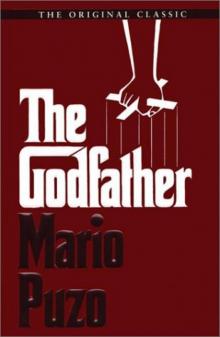 The Godfather
The Godfather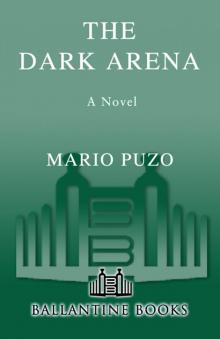 The Dark Arena
The Dark Arena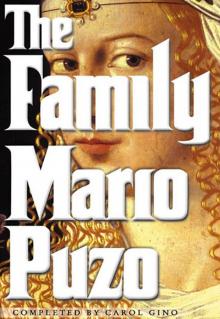 The Family
The Family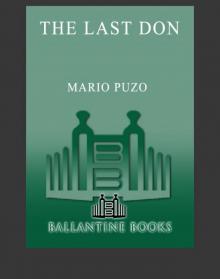 Last Don
Last Don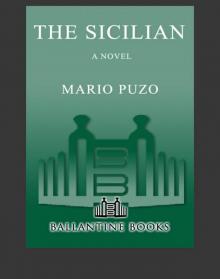 The Sicilian
The Sicilian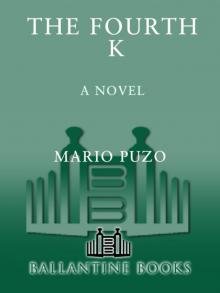 The Fourth K
The Fourth K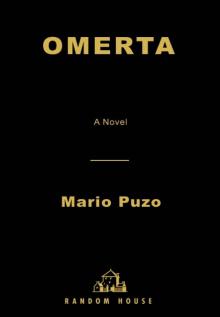 Omerta
Omerta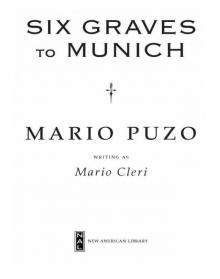 Six Graves to Munich
Six Graves to Munich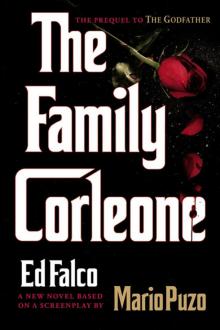 The Family Corleone
The Family Corleone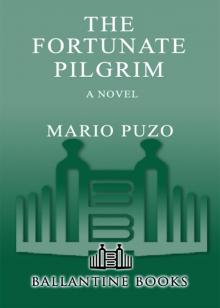 The Fortunate Pilgrim
The Fortunate Pilgrim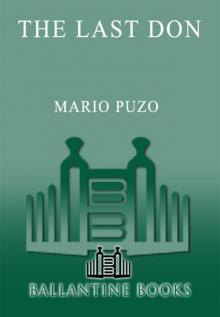 The Last Don
The Last Don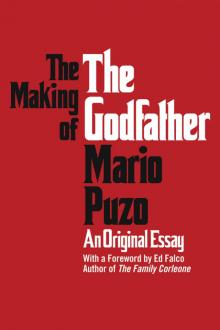 The Making of the Godfather
The Making of the Godfather Fools die
Fools die The Sicilian (v2.0)
The Sicilian (v2.0)